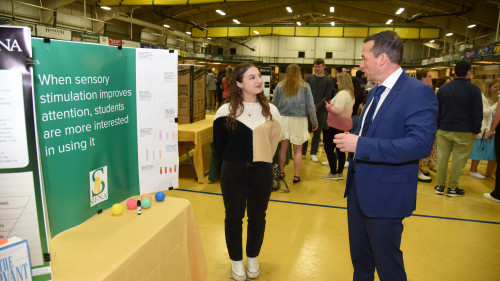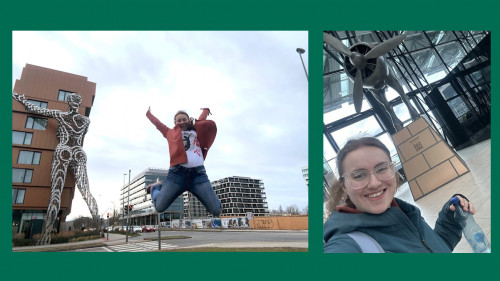

By Rebecca Davis ’15
Before seeing Siena’s fall production of the play “Child Soldier,” the program lets you know that it is a true story. Written by J. Thalia Cunningham in collaboration with creative arts professor Mahmood Karimi-Hakak, “Child Soldier” gives its audience a glimpse into the life of a young woman named Destiny. The central character tries to navigate life in the United States as a high school student while being tormented by her past as a child soldier in Liberia. Faced with racial discrimination at school and pressure from a former Liberian military leader to become a prostitute in order to get a green card so she can apply to college, Destiny shows that even when the war is over, for a child soldier the internal battle rages on.
“Destiny’s story is not only the story of an individual, it is the story of many child soldiers all over the world,” said Karimi-Hakak, who directed and produced the play. “What happens to Destiny is really what happens to a generation. Not only in one place, not only in one class, but generations of people. It is often a matter of militarization being put over education.”
As noted in the play’s program, in the past 25 years, an estimated 11,000 children have fought in two civil wars in Liberia. These children are recruited at a very young age. They are often forced to use drugs and commit acts of torture and murder. For young girls, being child soldiers often means suffering horrific sexual abuse. Destiny’s story is an example of how those memories of war and forced violence leave traumatic scars on their lives forever.
The play is presented in a unique way, with four stages built in a circle so that the audience in the center must turn to see where the next scene will take place. The movement was intended to create the illusion of time passing. Combined with large screens in the background to create the setting, the stage orientation leads to a dynamic and immersive performance that is at once emotional and graphically shocking.
“I was captivated throughout the play,” said psychology major Hai Nguyen ’16. “It made me realize that there is more going on in the world than my own daily routine.”
Making people think and discuss the play was one of Karimi-Hakak’s main goals.
“Theater is the only art which is totally based on dialogue, on conversation. If that dialogue can be extended from the stage to the audience to the greater society, maybe we as artists can bring these issues to the forefront of our global village,” Karimi-Hakak said. “As an artist, it is important for me to see art as a means of change. Artists are there to enlighten the society, to look at the other, brighter side of the coin and to educate and work towards peace.”
“Child Soldier” was put on by the Creative Arts Department and Stage III.

